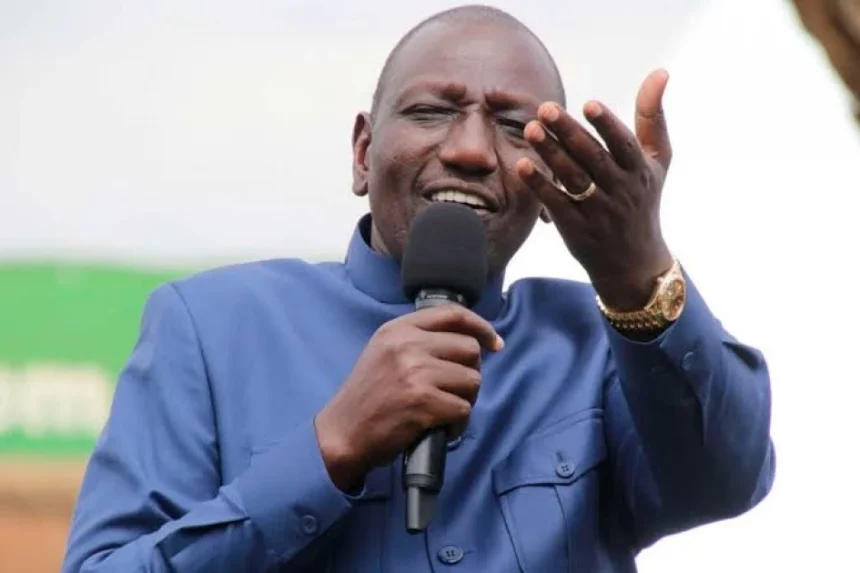Over the last couple of months, President William Ruto has gone on an image-defending overdrive, appearing to be intently keen on reminding Kenyans that he’s a sober-minded individual who is acutely in charge of the nation’s affairs.
The President appears to have grown weary of people calling him out, blasting his administration and castigating his various policies, taking time to remind the world that his cognitive abilities are top-notch and that he’s in no way acting like a deranged lunatic who has no psychological control over his actions.
In multiple public rallies and events, in what is now becoming a worrying trend, the President has repeated this declaration: “I’m not a madman!”
Keen analysts will agree that he doesn’t make that statement as a fleeting, off-the-cuff humorous jab at himself – he makes it with a serious face, a stern tone and a grave urgency, meaning that he wants to be taken seriously and to be trusted, unequivocally.
The sudden ‘I’m not mad!’ outbursts seem to have stemmed from the fact that, no matter what he does, says or initiates, Kenyans still don’t trust him, don’t celebrate him and don’t want him to be at the helm of the nation’s highest office, leaving him stumped over what exactly he is doing wrong and what the people really want.
Even on good days, when there is no major scandal doing rounds, random crowds of Kenyans, either at national sports events or packed festivals, will break out in the all-too-familiar chant: “Ruto Must Go!”
Seated in his vaunted chair at State House, the president must wonder what is constantly causing this stubborn antagonism and whether he’s sane enough to prove to Kenyans that he is a level-headed administrator of the nation.
Advertisements
Ruto’s obsession with his sanity appears to have begun way before he ascended to the Presidency.
Back in March 2020, at the funeral of his former chief of security, Sergeant Kipyegon Kenei, a stone-faced Ruto, then a Deputy President, told mourners and Kenei’s family members that he was not a mad man, insisting that a political witch hunt would not create a wedge between him and his community.
He said, “I’m the Deputy President of Kenya. I’m not a mad man. I know what I’m saying. Therefore, woe unto those planning these attacks to divide me and my community…”
While still DP, Ruto would address a public gathering during the electioneering period, adding that he was not only sane but also sober – this was in response to critics blasting him for his wheelbarrow crusade.
“Mimi sio wazimu. I’m the Deputy President of Kenya, and I’m not a mad man. I’m also not drunk, neither am I stupid. I know what I’m saying. There’s an issue we must sort out. Quit the insults…” he said.
Last year, at the National Prayer Breakfast, while struggling to defend his decision to charter the super expensive Boeing 737-700 VIP plane for his maiden US tour, again, the evidently exasperated President told the gathered dignitaries that he was a mentally-stable leader who could not afford to expend the public purse.
“I am a very responsible steward, believe you me. There is no way I can spend Ksh.200 million in fact it costs the Republic of Kenya less than Ksh.10 million because I am not a madman!” he bellowed.
At a town hall rally he held in December in Mombasa, Ruto would once again reprimand his detractors over the Adani-JKIA deal, vehemently denying claims that he would sell Kenya’s national airport, clarifying that he was sane enough to eschew such a disastrous deal.
“I have seen many people say, William Ruto wants to sell the Airport. Am I a madman? How do you sell a strategic national asset? You’d have to be insane!” he stated.
Over the past weekend, during a church service in Elgeyo Marakwet, the President firmly maintained that he would shame his critics by delivering on his ambitious promises that some Kenyans have continued to harshly ridicule.
“I see some people are worried, saying I am telling lies. I want to tell those saying that what we say will not be fulfilled, we will embarrass you in a short while,” he noted.
“We are going to make sure that we acquit ourselves of every commitment we have made, and I am not a madman, I know what I am doing, so we will plan all things.”
Faced with mounting hostility and a populace which finds it hard to believe his statements and comprehend his actions, the President appears to have found the perfect rebuttal – declaring that he’s of sound mind, hoping that this may somewhat help in changing the narrative about him and assuring Kenyans that only a psychotic person would pull off the ills people accuse him of.
In countries like the USA, presidents are routinely asked to take a cognitive test, which is basically a mental evaluation which assesses a variety of brain functions like planning, organising information and problem solving, short-term memory, spatial skills and language skills.
The tests are used to identify potential problems with brain function. They can also be used for various purposes, including diagnosis, monitoring, and assessing an individual’s ability to perform specific tasks or functions.
Cognitive Neurologist Ziad Nasreddine told the US News: “All of these cognitive functions are essential for our daily life…So for a president, obviously these are the minimum requirements: that you have a good memory and good concentration, good focus, good attention.”
After his poor performance at the first presidential debate back in July 2024, democratic lawmakers and political commentators called on then-President Joe Biden to take a cognitive test to illustrate his mental capacity.
“I’m tested every single day on my neurological capacity, the decisions I make every day,” Biden defended himself. “You talk to my staff…I don’t think you have them telling that all the major ideas we’ve undertaken haven’t been, in part, initiated by me.”
Just last Friday, a cognitive test was among the tests President Donald Trump had during his first physical of his second term at Walter Reed National Military Medical Centre.
As usual, Trump bragged about his mental acuity, saying, “I took a cognitive test. And I don’t know what to tell you, other than I got every answer right. I took just a lot of different tests, having to do with the heart, having to do with other things.”
Kenyan presidents do not normally undergo routine public tests to gauge their mental capacities, and even when they do – assuming they do – the results are never shared with the public and/or published in the media.
President Ruto may be struggling to convince Kenyans that his mental state has never been healthier… But the question remains, what is it that he keeps doing which makes Kenyans continuously doubt his sanity?



